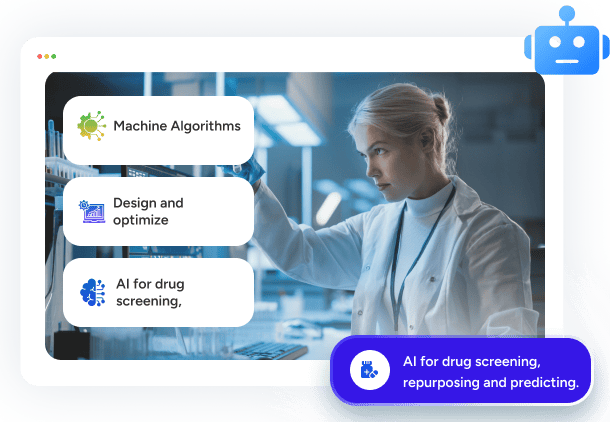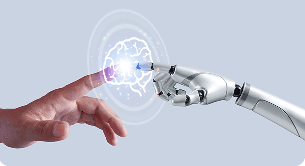
AI-Powered
AI-Driven Drug Discovery and Development
Enhancing the Speed and Economics of Drug Development Lifecycle

AI-derived molecules have a success rate of 80-90% in Phase I trials.

Challenges of Traditional Drug Discovery Techniques


Conventional methods primarily rely on identifying and improving existing compounds.

Limited understanding of complex biological systems can slow development pipelines.

Incomplete or heterogeneous data hinder accurate predictions, increasing the risk of failure.

Poor success rate due to a small percentage of drug candidates moving from lab to market.

Exhaustive, costly, and inefficient trial designs leading to substandard patient outcomes.

Difficulties in identifying right biological targets and comprehending disease mechanisms.
Discover how AI can transform your pharmaceutical R&D
The Solution:
AI-Enabled Drug Discovery and Development

Machine learning algorithms to identify and validate potential drug targets.

Design and optimize new drug candidates with greater safety and efficacy.

AI for drug screening, repurposing and predicting drug-patient interactions.

How AI Helps Design Clinical Trials






AI Drug Discovery in Clinical Trials



AI-Accelerated Drug Discovery


Benefits of AI-Enabled Drug Discovery and Development

Identify potential drug targets faster by analyzing extensive datasets.

Design new and effective molecules with enhanced pharmacological traits.

Optimize clinical trial designs by identifying appropriate patient subgroups.

Accurate predictions of the bioactivity of different drugs and compounds.

Discover promising therapeutic uses for existing drugs and medications.

Tailor drug combinations and treatment approaches for individual patients.

AI automated inspections to ensure drugs meet strict quality standards.

Get a custom AI solution to advance new drug discovery

How Fingent Helps With AI-Powered Drug Discovery and Development?

Custom AI software development for life sciences and biopharma

Healthcare AI consulting services and software solutions

AI-powered custom dashboards and visualizations for R&D teams

AI-enhanced predictive technology and knowledge graphs

Customized software solutions for multi-modal data modeling

Enterprise AI applications tailored to run drug discovery workflows

Custom drug discovery platforms employing Gen AI and AutoML
Key Takeaways
















































